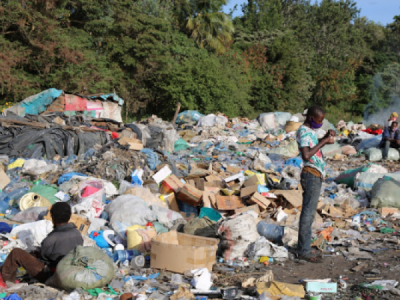
Posted on August 13, 2020
Grabbing of wetlands along rivers that would have acted as water filters and replacing them with buildings is a major problem affecting all wetlands found in urban areas
In Summary
- Nema raises concerns over the rising pollution within the Kalundu Ecosystem.
- Waters are so polluted they are unfit for human use and can only support limited aquatic life.
The government of Kitui has relocated its dumpsite from the source of Kalundu River to Kanyonyoo to pave the way for an ecological park and accelerate urban conservation.
The township dumpsite, situated approximately two kilometres west of the Central Business District, is choking on raw human, industrial and medical waste, which has replaced aquatic life and polluted the once clear waters.
Similarly, the river’s hydrology has been greatly transformed because of continued dredging and the canalisation by subsistence farmers growing vegetables and other crops along the river banks.
Speaking during a tour on Saturdayto reclaim the wetland under the Kazi Mtaani, initiative, Kitui county commissioner John Ondego said Nema officials have visited the relocation site and are satisfied that the area was suitable for a dumpsite.
He noted that the ecological park will be a crucial component of the sustainable growth of the town and conserve the river source.
“It is critical to conserve river sources not only because of the potential to reduce the ecological impacts of urban life, but also because of their potential to communicate new cultural conceptions of the human relationship to nature,” Ondego said.
He added that parks should be managed as systems to help citizens function at their best not just for the usual purposes of beauty and recreation.
“The government will rehabilitate the Kalundu River and its network of tributaries by identifying and sustainably addressing sources of river pollution, reclaiming riparian land and initiating landscape management activities, which include tree planting,” the administrator said.
He noted that the main source of pollution was from untreated industrial waste and raw sewage from informal settlements.
He further said the degradation of wetlands is triggered by physical modification of the landscape, depletion of wetland biological resources through over-exploitation, encroachment and settlement.
“Grabbing of wetlands along rivers that would have acted as water filters and replacing them with buildings is a major problem affecting all wetlands in urban areas,” he said.
The county commissioner said the national and county governments have come up with a proper mechanism and policy that will involve the residents in the clean-up of the rivers through the Kazi Mtaani initiative.
Kitui municipal manager Job Muisyo said the Kalundu River basin has the potential of becoming a great tourist attraction and create thousands of jobs directly and indirectly by making public green spaces.
Muisyo noted that segregating household and industrial waste at the source will ensure proper utilisation of recyclable waste.
Source: the-star.co.ke





